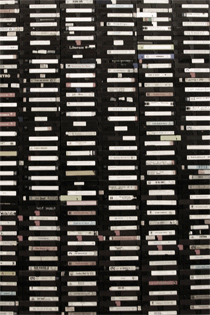Thibaut Dubarry | 22.02.2021
The purpose of this article is to explore the reenchantment of a church in a South African township. Effervescence of entertainment while crossing through worships appears as a new source of holiness. Present seems in that to substitute to the past as an authority able to legitimate the religious. That’s why this transcendence goes beyond the traditional antinomy between holiness and profane, inviting to rethink religion in modern times [...]
Christophe Premat | 18.02.2021
The eighth volume of Castoriadis’ political writings sheds light on the relationship between economy and imaginary. By carrying out an accurate editorial work, Enrique Escobar, Myrto Gondicas and Pascal Vernay extracted comments, notes and texts from the archives of Castoriadis that help the reader to understand better Castoriadis’ views on the economy of capitalism and on Marx’ theses in the Capital. The second part of the volume brings together the geopolitical analyzes of Castoriadis on global capitalism. [...]
| 17.02.2021
Librarians in North America have long-standing relationships with Western European libraries and materials vendors to support research in the humanities and to maintain non-English collections. In today’s research and budgetary environments there are increasing pressures on the traditional humanities, while developments in technology and large-scale initiatives offer new opportunities for collaboration among libraries, publishers, and [...]
Enka Blanchard, Stéphane Gallardo, Shin Alexandre Koseki, Carole Lanoix, Olivier Lazzarotti et Irène Sartoretti | 11.02.2021
Avec l’apport du rhizome Chôros. Presque 40 ans après, imaginons ce que serait le carrefour Mabillon sous la plume de Perec : “19 mai 2020. 3, 4, non 5 SUV défilent, les conducteurs aux visages masqués, au passage 3 piétons attendent le feu, chacun à distance. A chaque arrêt, la même appréhension : où se place-t-on [...]
| 11.02.2021
Modalités de participation La revue Frontières vous convie au colloque en ligne Les technologies numériques et la mort, qui se tiendra le 12 février 2021 de 8h30 (Montréal) / 14h30 (Paris) pour finir à 15h45 (Montréal) / 21h45 (Paris). Le colloque se tiendra sur la page https://webinaires.uqam.ca/frontieres2021 Aucune inscription requise Présentation À l’heure où notre vie sociale est peu à peu « colonisée » [...]
Luna de Araujo | 15.01.2021
The medical and social recognition and treatments of persistent pain vary according to the diagnosed diseases and the social, economic and family situations in which the affected persons find themselves. Some repetitions and disruptions underlying and common to the experiences of the women who participated in this research nevertheless make it possible to understand the entanglement of the biological, material, practical and structural aspects that shape the chronicity of their pain. Through Flora Weill's story, her painful trajectory and [...]
Sonia Chardonnel, Sandrine Depeau, Thomas Devogele, Boris Mericskay et Jean-Paul Thibaud | 12.01.2021
Cet article s’inscrit dans le champ de recherche des pratiques de mobilités quotidiennes enfantines étudiées à travers des traces numériques issues de capteurs (géolocalisation, audiovisuels) et enrichies d’informations sémantiques et contextuelles. Nous montrons comment la trace constitue une notion partagée entre les différentes disciplines (géographie, informatique, psychologie environnementale, sociologie) engagées dans la recherche Mobi'kids qui vise à comprendre les conditions d’évolution des mobilités quotidiennes d’enfants. Nous proposons d’abord un cadre conceptuel autour de la trace pour définir de façon [...]
| 10.01.2021
Séminaire de la Direction de la recherche, des études, de l’évaluation et des statistiques (DREES) sur les travaux Covid-19 Programme du séminaire Première séance (14 janvier 2021) La première séance a porté sur des travaux qui ont écarté les agents concernés de leur manière habituelle de travailler (réalisation d’une revue de littérature de grande envergure [...]
Modèles géographiques pour un événement hybride
Jacques Lévy et Sébastien Piantoni | 05.01.2021
In a pandemic, hybrid mechanisms emerge and the social world that results of them is not easy to decipher. It is all the truer in the case of the SARS-CoV-2, we still don’t know everything about. This paper tries to identify and analyse the geographies of urbanity of states. It questions the relationships between the multiple spatial layers that manufacture this troublesome co-spatiality. [...]
Jacques Lévy | 18.12.2020
Cet article est proposé par le rhizome Chôros. Pour expliquer la dynamique de la pandémie du Sars-CoV-2 de 2020, de nombreux « facteurs » simples ont été proposés : l’âge ou des prédispositions génétiques des patients, la pollution… dont certains, d’autre moins, ont résisté à l’avalanche des informations et aux avancées de la recherche. D’autres, comme la température (le [...]


